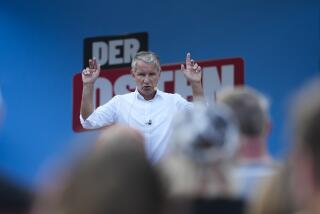Calls of ŌĆśKohl Should GoŌĆÖ Haunt Beleaguered Bonn Chancellor
BONN ŌĆö Chancellor Helmut Kohl was on vacation at an Austrian spa Monday, but the press back home was full of his political troubles--and advice on what to do about them.
Much of the advice took the same line: that Kohl ought to resign, either as head of the West German government or at least as chairman of the Christian Democratic Union.
Der Spiegel, the national news magazine, pictured a harassed Kohl on its cover with the headline, ŌĆ£Kohl Should Go--but How?ŌĆØ
KohlŌĆÖs picture was also on the cover of Stern, the other national news magazine. It showed him badly bruised and bandaged and asked, ŌĆ£Can We Still Afford Kohl?ŌĆØ
Kohl has survived this sort of fire before, but now he is facing the most perilous period in his six years as chancellor. Just before he left for Austria, the normally confident chancellor admitted at a news conference, ŌĆ£We are in a very serious situation.ŌĆØ
Two Election Defeats
His coalition has lately been dealt a couple of serious electoral defeats. The most recent was in West Berlin, where a coalition of KohlŌĆÖs Christian Democrats and the Free Democrats was driven from office by the opposition Social Democrats and the radical environmentalist Greens.
This was followed by the loss of the city of Frankfurt, the West German financial capital, after 12 years of Christian Democratic rule. The Christian DemocratsŌĆÖ share of the vote plunged by 13%.
In both elections, parties of the far right surged past the 5% threshold to acquire seats in the city government, while the Free Democrats failed to make the grade.
The dismal showing of the Free Democrats has led many observers to question the partyŌĆÖs role in the national coalition. Sharp differences between Kohl and his foreign minister, Free Democratic leader Hans-Dietrich Genscher, have been blamed in part for the poor showing.
A national polling institute, Forsa, commented: ŌĆ£After these elections, it must be feared that the whole system could slide into discredit if both big parties--the Christian Democrats and the Social Democrats--do not take the people and their warnings seriously.ŌĆØ
Kohl Is the Main Target
While Foreign Minister Genscher has been excoriated by some commentators for his seeming refusal to stick to the foreign policy subscribed to by the chancellor, Kohl is the main target.
The rise of the right-wing parties is generally attributed to KohlŌĆÖs allowing a large number of asylum-seekers and ethnic Germans from Eastern Europe and the Soviet Union into the country at a time of high unemployment and a shortage of low-cost housing.
Kohl has also offended many Germans with his on-again, off-again policies on the important issues of health insurance, pensions and tax reform. He seems to be unable to choose between the left and right wings of his shaky coalition.
He has been given conflicting advice by Free Democrats on the left and by his ally the Bavarian Christian Social Union on the right, and he seems to be caught in a shrinking middle ground.
Kohl has also seemed to lack leadership by vacillating on the question of modernizing the WestŌĆÖs short-range nuclear weapons and the question of West German firmsŌĆÖ involvement in alleged poison gas factories in Iraq and Libya.
Kohl is reportedly thinking of reorganizing his Cabinet in an effort to improve the governmentŌĆÖs image. Defense Minister Rupert Scholz, for one, has been identified with a series of political mishaps.
But most political commentators, including those who support the Kohl government, believe that more than a Cabinet reorganization will be needed to restore confidence in the Kohl government.
If Kohl is forced to step aside, the Christian Democrats have a potential successor in the wings in the person of Lothar Spaeth, premier of the state of Baden-Wuerttemberg.
On June 18, Germans will vote for members of the European Parliament, and at the same time there will be local elections in the states of Rhineland-Palatinate and the Saarland. This, some observers say, could be the last chance for Kohl to restore his battered coalition before the national elections scheduled for December, 1990.
More to Read
Sign up for Essential California
The most important California stories and recommendations in your inbox every morning.
You may occasionally receive promotional content from the Los Angeles Times.










